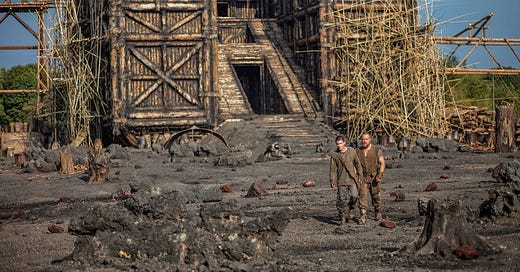Noah, the Nephilim and the Descendants of Seth

My son Brenden and I both saw the movie Noah separately. So when we finally got to talk about the movie we spent a lot of time talking about the Watchers and the Nephilim. We also talked a lot about the tensions in the movie between the descendants of Seth and Cain.
A lot of conservative Christians have been offended by Noah, thinking that the movie takes too many liberties with the biblical story.
But the biblical story is really weird, and a lot of the plotlines in the movie are true to various streams of interpretation.
For example, the movie made Brenden and I revisit a post I wrote about the Nephilim and the descendants of Seth:
Genesis 6.1-4 (NIV)
When human beings began to increase in number on the earth and daughters were born to them, the sons of God saw that the daughters of humans were beautiful, and they married any of them they chose. Then the Lord said, “My Spirit will not contend with humans forever, for they are mortal; their days will be a hundred and twenty years.”
The Nephilim were on the earth in those days—and also afterward—when the sons of God went to the daughters of humans and had children by them. They were the heroes of old, men of renown.
Who were the Nephilim?
Genesis 6 say that the Nephilim were the offspring of "the sons of God" and the "daughters of men." Children who go on to become "the heroes of old, men of renown." Along these lines, some think the Nephilim were giants as the only other appearance of the word Nephilim occurs in Numbers in the description the spies bring back about the people in the land of Canaan:
Numbers 13.32-33
And they spread among the Israelites a bad report about the land they had explored. They said, “The land we explored devours those living in it. All the people we saw there are of great size. We saw the Nephilim there (the descendants of Anak come from the Nephilim). We seemed like grasshoppers in our own eyes, and we looked the same to them.”
As to the etymology of the word Nephilim the consensus seems to be that it comes from the root npl (נָפַל) "to fall" suggesting that Nephilim means "the fallen" or "the fallen ones."
There are many curious things about the Nephilim in Genesis 6, but perhaps the most curious thing has to do with their origins. What's going on with all this business about "sons of God" having sex with "daughters of men"?
There have been two schools of thought about this: the fallen angel theory and the descendants of Seth theory.
I think most are familiar with the fallen angel theory. In this view the "sons of God" refer to angelic beings who lust after human women and have sex with them. The children of these unions are the Nephilim who seem to be like demigods. This view gains some support from various noncanonical sources like the book of Enoch where we also read about the Watchers.
The second theory has to do with marriage between the descendants of Seth and the descendants of Cain.
In Genesis 5 we begin to transition out of material related to the first family and into the story of Noah and the flood. To mark this transition there are some genealogies given in Genesis 5. One of the things you notice in these genealogies is that it seems that Seth is contrasted with Cain, with Seth being good and Cain being bad. The descendants of Seth are the good bloodline and the descendants of Cain are the bad bloodline.
One sign you get of this has to do with the 7th descendent in each line. The 7th descendant on Seth's side is Enoch who we are told "walked with God" and who did not die but was "taken away by God."
By contrast, the 7th descendant on Cain's side is Lamech who comes across as a general badass, a sort of super-duper Cain as I've written about before.
All fine and dandy, but why would human descendants of Seth be called "sons of God"?
The idea goes back to how Seth seems to be the "image bearer" of God as his father Adam was:
Genesis 5.1-3
This is the written account of Adam’s family line.
When God created mankind, he made them in the likeness of God. He created them male and female and blessed them. And he named them “Mankind” when they were created.
When Adam had lived 130 years, he had a son in his own likeness, in his own image; and he named him Seth.
The argument here is that the "image of God" is carried through the line of Seth.
So the problem in Genesis 6 is that these "sons of God"--the descendants of Seth--"fall" when they begin to intermarry with the descendants of Cain ("the daughters of men").
In Noah we don't see this intermarrying, but in the movie we do see the worry emerge in Noah's resistance to find wives for his sons from among the daughters of Cain.



